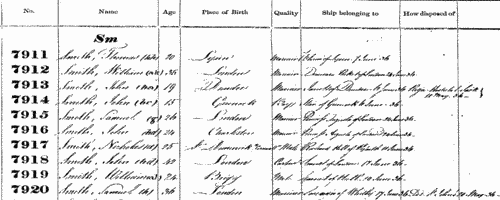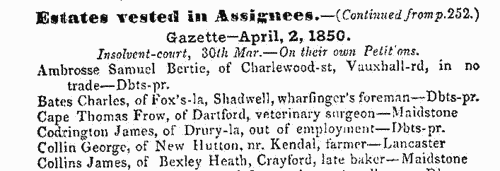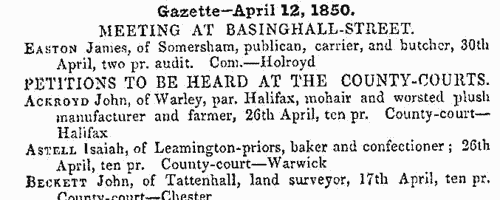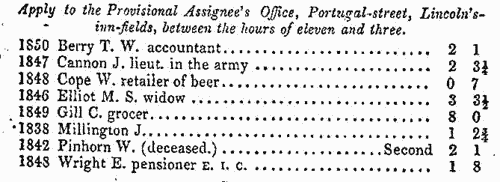Chant Surname Ancestry ResultsOur indexes 1000-1999 include entries for the spelling 'chant'. In the period you have requested, we have the following 132 records (displaying 41 to 50): Single Surname Subscription | | | Buying all 132 results of this search individually would cost £768.00. But you can have free access to all 132 records for a year, to view, to save and print, for £100. Save £668.00. More... |
These sample scans are from the original record. You will get scans of the full pages or articles where the surname you searched for has been found. Your web browser may prevent the sample windows from opening; in this case please change your browser settings to allow pop-up windows from this site. Poachers committed to prison at Wilton in Somerset
(1833-1836)
In response to a parliamentary enquiry, returns were made in early 1836 from each of the gaols in England and Wales of the number of commitments, prosecutions, convictions and sentences under the game laws since 1 November 1833. The returns varied in scope; most give the full name of each poacher, date, and sentence. The usual offence is that of 'poaching', i. e. being out armed in the night in pursuit of game; occasionally it was aggravated by assaulting a gamekeeper &c.CHANT. Cost: £6.00.  | Sample scan, click to enlarge

|  British merchant seamen
(1835-1836) British merchant seamen
(1835-1836)
At this period, the foreign trade of ships plying to and from the British isles involved about 150,000 men on 15,000 ships; and the coasting trade about a quarter as many more. A large proportion of the seamen on these ships were British subjects, and so liable to be pressed for service in the Royal Navy; but there was no general register by which to identify them, so in 1835 parliament passed a Merchant Seamen's Registration Bill. Under this act this large register of British seamen was compiled, based on ships' crew lists gathered in British and Irish ports, and passed up to the registry in London. Each seaman was assigned a number, and the names were arranged in the register by first two letters of the surname (our sample scan shows one of the pages for 'Sm'); in addition, an attempt was made to separate out namesakes by giving the first instance of a name (a), the second (b), and so on. But no effective method was devised to prevent the same man being registered twice as he appeared in a second crew list; moreover, the original crew lists were clearly difficult for the registry clerks to copy, and some of the surname spellings appear to be corrupted. A parliamentary committee decided that the system devised did not answer the original problem, and this register was abandoned after less than two years: but it is an apparently comprehensive source for British merchant seamen in 1835 to 1836. The register records the number assigned to each man; his name; age; birthplace; quality (master, captain, mate, 2nd mate, mariner, seaman, fisherman, cook, carpenter, boy &c.); and the name and home port of his ship, with the date of the crew list (usually at the end of a voyage). Most of the men recorded were born in the British Isles, but not all (for instance, Charleston and Stockholm appear in the sample scan). The final column 'How disposed of' is rarely used, and indicates those instances where a man died, was discharged, or deserted his ship during the voyage.CHANT. Cost: £8.00.  | Sample scan, click to enlarge

|  London Policemen
(1830-1842) London Policemen
(1830-1842)
The Metropolitan Police Register of Joiners (MEPO 333/4) lists policemen joining the force through to 31 December 1842 (to warrant number 19892). The register is alphabetical, in so far as the recruits are listed chronologically grouped under first letter of surname. It is evidently a continuation of a similar earlier register, not closed until its alphabetical sections were filled: consequently, there are no entries in this register for the initial letters N, O, Q, U, V, X, Y or Z; and the sections of this register start at different dates - A 18 April 1840 (warrant number 16894); B 11 December 1830 (5570); C 7 September 1830 (4988); D 27 May 1833 (8445); E 15 December 1838 (14476); F 30 March 1832 (7372); G 1 December 1835 (11,184); H 25 April 1832 (7457); I and J 13 February 1837 (12449); K 2 January 1838 (13457); L 3 October 1834 (9905); M 15 November 1832 (7999); P 4 October 1831 (6869); R 4 September 1837 (13021); S 30 March 1835 (10366); T 6 April 1840 (16829); W 30 December 1833 (9096). The register gives Date of Appointment, Name, Number of Warrant, Cause of Removal from Force (resigned, dismissed, promoted or died), and Date of Removal. Although the register was closed for new entrants at the end of 1842, the details of removals were always recorded, some being twenty or more years later. Those recruits not formerly in the police, the army, or some government department, were required to provide (normally) at least two letters of recommendation from persons of standing, and details of these are entered on the facing pages: the names in these are indexed separately - this index refers only to the police constables. Where a recruit was only recently arrived in the metropolis, the names and addresses of the recommenders can be invaluable for tracing where he came from.CHANT. Cost: £8.00.  | Sample scan, click to enlarge

| Dissolutions of Partnerships
(1842)
Trade partnerships dissolved, or the removal of one partner from a partnership of several traders, in England and Wales
CHANT. Cost: £6.00.  | Sample scan, click to enlarge

| Merchant Seamen (1835-1844)
At this period, the foreign trade of ships plying to and from the British isles involved about 150,000 men on 15,000 ships; and the coasting trade about a quarter as many more. A large proportion of the seamen on these ships were British subjects, and so liable to be pressed for service in the Royal Navy; but there was no general register by which to identify them, so in 1835 parliament passed a Merchant Seamen's Registration Bill. Under this act a large register of British seamen was compiled, based on ships' crew lists gathered in British and Irish ports, and passed up to the registry in London. A parliamentary committee decided that the system devised did not answer the original problem, and the register was abandoned after less than two years: the system was then restarted in this form, with a systematic attempt to attribute the seamen's (ticket) numbers, and to record successive voyages. The register records the number assigned to each man; his name; age; birthplace; quality (S = seaman, &c.); and the name and official number of his ship, with the date of the crew list (usually at the end of a voyage). Most of the men recorded were born in the British Isles, but not all. The system was still very cumbersome, because the names were amassed merely under the first two letters of surname; an attempt was made to separate out namesakes by giving the first instance of a name (a), the second (b), and so on. In this volume the register is restarted from 1840 onwards, with the mariner's previous number (if any) being entered in the column after his birthplace. In the event of it becoming known that a man had died during the course of a voyage, that information is written across the remaining empty columns. This volume (BT 112/12) covers mariners whose surnames start with Ce (and McCe), Ch (and McCh) and a handful with Ci.
CHANT. Cost: £8.00.  | Sample scan, click to enlarge

| Insolvents imprisoned for debt in England and Wales
(1850)
Perry's Bankrupt and Insolvent Gazette, issued monthly, included brief notices of insolvents' estates surrendered to assignees. Each entry gives the surname and christian name of the insolvent, trade and address, followed by the name of the prison. This is the index to the names of the insolvents, from the issues from January to December 1850.CHANT. Cost: £6.00.  | Sample scan, click to enlarge

| Insolvents in England and Wales
(1850)
Perry's Bankrupt and Insolvent Gazette, issued monthly, included lists of insolvencies and stages in the process whereby the insolvents petitioned for release from debtors' prison. The insolvent is generally referred to by name (surname first), address and trade. This is the index to the names of the insolvents, from the issues from January to December 1850.CHANT. Cost: £6.00.  | Sample scan, click to enlarge

| Dividends of insolvents' estates in England and Wales
(1851)
Perry's Bankrupt and Insolvent Gazette, issued monthly, included brief notices of dividends of insolvents' estates. Each entry gives the year that the insolvency was first gazetted, the surname and initials of the bankrupt, trade and address; followed by the amount of the dividend as shillings and pence in the pound. This is the index to the names of the insolvents, from the issues from January to December 1851.CHANT. Cost: £6.00.  | Sample scan, click to enlarge

|  Soldiers and staff in Wellington Barracks, Westminster
(1851) Soldiers and staff in Wellington Barracks, Westminster
(1851)
The 1851 census enumerators' books for the mass of the population record the information as in this sample scan. However, there were also separate books for the major public institutions. The instructions for the first column (Name and Surname of each Person who abode in the Institution on the Night of the 30th March, 1851) run: "Write after the Name of the Master or Head of the Institution the Names of his Wife, Children, other Relatives, and Servants; then the Names of the Officers, their Families, and Servants. Commence the list of Inmates for which the Institution is provided on another page." For the second column (Position in the Institution): "State whether the person is the Head, or an Officer or Servant, or the Wife, Son, Daughter, or other relative of such Officer or Servant. If an Inmate, state whether patient, soldier, scholar, &c." For the third column (Condition): "Write 'Married,' 'Widower,' 'Widow,' or 'Unmarried,' against the Names of all Persons except Young Children." For the fourth column (Age (last Birthday)): "For Infants under One Year state the Age in Months, writing 'Under 1 Month,' '1 Month,' '2 Months,' &c." For the fifth column (Rank, Profession or Occupation): "State here the profession, or what is believed to have been the ordinary occupation of the Inmate before admission into the Institution. Carefully distinguish in this column the different kinds of 'laborers,' and those who have been masters in trade from others." For the sixth column (Where Born): "Opposite the Names of those born in England, Scotland, or Ireland write the County, and Town or Parish. If born in the British Colonies, the East Indies, or in Foreign Parts, state the Country; in the last case, if a British Subject, add 'British Subject.'" For the seventh column (Whether Blind, or Deaf-and-Dumb): "Write 'Deaf-and-Dumb,' or 'Blind,' opposite the Name of the Person.'" Wellington Barracks was in the city of Westminster; in the parish of St Margaret and the ecclesiastical district of Christ Church; in Westminster superintendent registrar's district, and St Margaret registrar's district. There were four officers, two family members, 15 servants, and 609 soldiers and wives. HO 107/1480
CHANT. Cost: £2.00.  | Sample scan, click to enlarge

| Traders and professionals in London
(1851)
The Post Office London Directory for 1851 includes this 'Commercial and Professional Directory', recording about 80,000 individuals. CHANT. Cost: £4.00.  | Sample scan, click to enlarge

|
Research your ancestry, family history, genealogy and one-name study by direct access to original records and archives indexed by surname.
|













